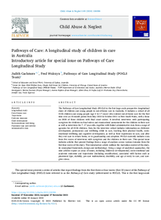The Pathways of Care Longitudinal Study (POCLS) is the first large-scale prospective longitudinal study of children and young people in out-of-home care in Australia. It includes a cohort of all 4126 children and young people (age 0 to 17 years) who entered out-of-home care for the first time over an 18-month period from May 2010 to October 2011 in New South Wales, with a focus on 2828 of these children with final court orders.
It involved interviews with participating caregivers for children on final orders and standardised assessments for the children in their care as well as interviews for 7–17 year-olds, together with linked administrative data from a range of agencies for all 4126 children. Data for the interview cohort includes information on children's development, permanency and wellbeing while in care, tracking their physical health, socio-emotional wellbeing and cognitive development, as well as their experiences in care, and after they exit care to return home, or to guardianship and adoption. POCLS currently includes data from five waves of interviews with caregivers and the children in their care. This special issue includes articles that present findings from a range of analyses across various domains from the first four waves of the study.
This introductory article outlines the Australian context of the study, its conceptual framework, design and methodology. Using a range of analytical approaches, the nine articles expose an array of issues, including children's developmental, socio-emotional and academic outcomes and trajectories (including reunification), associated with factors such as placement type, stability, pre-care maltreatment, disability, and age at entry to care, and caregiver stress.

